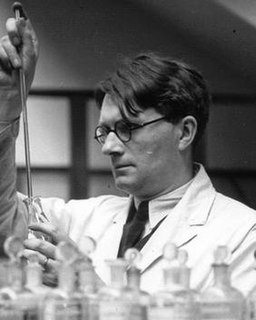A Quote by Joseph Needham
The hierarchy of relations, from the molecular structure of carbon to the equilibrium of the species and ecological whole, will perhaps be the leading idea of the future.
Related Quotes
We know from astronomy that the universe had a beginning, from physics that the future is both open and unpredictable, from geology and paleontology that the whole of life has been a process of change and transformation. From biology we know that our tissues are not impenetrable reservoirs of vital magic, but a stunning matrix of complex wonders, ultimately explicable in terms of biochemistry and molecular biology. With such knowledge we can see, perhaps for the first time, why a Creator would have allowed our species to be fashioned by the process of evolution.
Branches or types are characterized by the plan of their structure,
Classes, by the manner in which that plan is executed, as far as ways and means are concerned,
Orders, by the degrees of complication of that structure,
Families, by their form, as far as determined by structure,
Genera, by the details of the execution in special parts, and
Species, by the relations of individuals to one another and to the world in which they live, as well as by the proportions of their parts, their ornamentation, etc.
An increased push for energy efficiency, renewable energy technology, electric mobility - along with the growing digitalization movement and a universal carbon pricing structure - would speed up the carbon-free future and the rise of a global middle class we desperately need. We can and must all do our part.
Throughout the world today there is a gowing awareness of the failings of the Western model of development and a corresponding desire to look for more human-scale, ecological ways of living. If Ladakh now succeeds in creating for itself a future which retains the foundations of its traditional past, it will be an inspiring example of how all the various elements of an ecological future fit together.
Years later, my wife, Ilusion, woke me up to the realization that you can't just "dump" your whole species simply because you've had a few bad encounters with some of its members. ... Intimacy's a greater goal to seek. ...That true knowledge of intimacy within our own species will allow us to pass it along to interspecies relations.
The patterns that are normalized in the family - the whole idea that some people cook and some people eat, that some listen and others talk, and even that some people control others in very economic or even violent ways - that kind of hierarchy is what makes us vulnerable to believing in class hierarchy, to believing in racial hierarchy, and so on.
It is now widely realized that nearly all the 'classical' problems of molecular biology have either been solved or will be solved in the next decade. The entry of large numbers of American and other biochemists into the field will ensure that all the chemical details of replication and transcription will be elucidated. Because of this, I have long felt that the future of molecular biology lies in the extension of research to other fields of biology, notably development and the nervous system.
There is part of a structure in which every species is related to every other species. And they're built up on species, like a pyramid. The simpler cell organisms, and then the more complicated ones, all the way up to the mammals and birds and so forth. We call it 'developing upward'... The whole thing depends on every part of it. And we're taking out the stones from the pyramid.
We may, I believe, anticipate that the chemist of the future who is interested in the structure of proteins, nucleic acids, polysaccharides, and other complex substances with high molecular weight will come to rely upon a new structural chemistry, involving precise geometrical relationships among the atoms in the molecules and the rigorous application of the new structural principles, and that great progress will be made, through this technique, in the attack, by chemical methods, on the problems of biology and medicine.
From the point of view of the species, death is part of this whole process. You could say that species have evolved in such a way that individual members last a certain time. Perhaps a certain kind of species would be better able to survive if the individuals didn't last too long. Other kinds could last longer.
A diverse ecosystem will also be resilient, because it contains many species with overlapping ecological functions that can partially replace one another. When a particular species is destroyed by a severe disturbance so that a link in the network is broken, a diverse community will be able to survive and reorganize itself... In other words, the more complex the network is, the more complex its pattern of interconnections, the more resilient it will be.





































